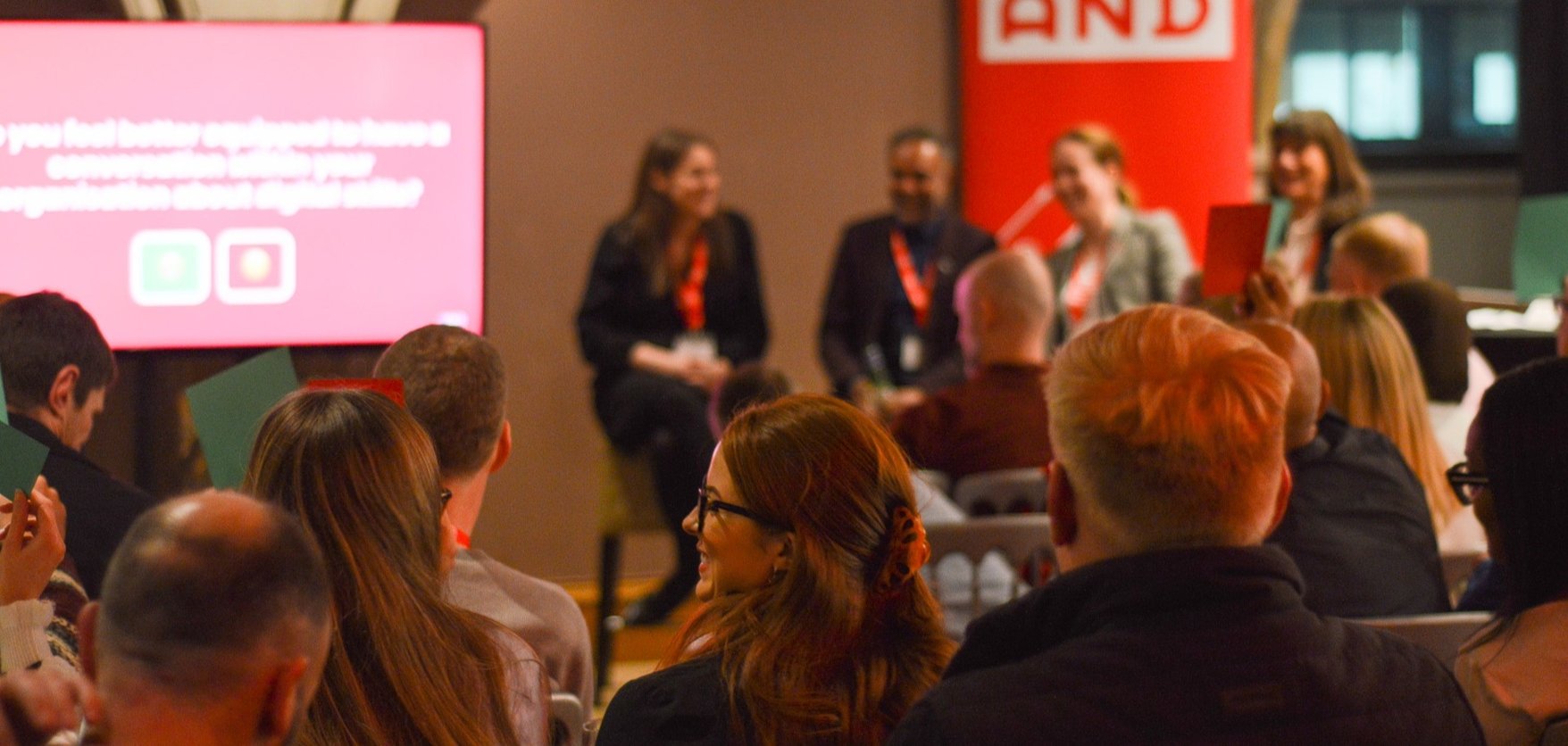Digital Skills Gap
The Digital Skills Debate: Leeds Highlights
22 November 2022 • 4 min read

We rounded off our 2022 Digital Skills Debate series with a bang, hosting the grand finale and our biggest audience to date at Aspire in Leeds.
This bustling city has been climbing its way up the UK ladder as a top city for digital talent and productivity, gaining a reputation for developing the skilled people and financial muscle required to fund startups and innovation. It is home to major companies like Asda, First Direct, Yorkshire Bank and Direct Line, but there's a reason AND Digital expanded to two Leeds Clubs in 2021. Like many in the UK, the city has a growing digital skills gap.
We invited a panel of experts to talk about how the #DigitalSkillsGap is affecting the city and the wider industry: featuring Amul Batra; COO of industry-leading bootcamp Northcoders, Eve Roodhouse, Chief Officer of Culture and Economy at Leeds City Council, Victoria Tomlinson; CEO at Next-Up, and our own Leeds Club Exec, Amy Cockram.
Six things we can do to close the skills gap in Leeds
Be collaborative to be competitive
Leeds needs to remain competitive as a digital city in the UK and globally, and to do that it needs to do what it does best: collaborate. There’s already great work in this area, like Leeds Digital Careers Festival, which engages digital organisations and training providers with the people of Leeds, to explore opportunities in the industry. But we need to go further with this, says Eve Roodhouse:
“Leeds City College faces a real challenge in teaching its students digital skills, because they struggle to compete with digital organisations to attract the right talent. Businesses in the city with enough capacity could be releasing staff to work at the college, to focus on upskilling and nurturing the next generation.”
Remember that tech is people
When we think of “tech” we often think of computers, lines of code, websites and apps. What we miss in that image is the people behind it, and the support they need to use that “hard” tech to their advantage. As Leeds Club Exec at AND Digital, Amy Cockram spoke about the clients she works with in the city, and the time the Club spends helping their teams engage and work better together. Often these businesses have the technical skills they need, but they need help to better structure their work, manage their strategy and communicate that effectively between teams.
“You can work in tech and digital without having to code. The power is in how you work. It’s too easy to forget that tech is people, and we need to build for them.”
Focus on the next generation, but don’t forget the over 50s
A recent study found that 87% of UK businesses do not see investment in IT skills as worthwhile for their over 50s workforce. Meanwhile, three quarters of that workforce don’t feel their skills are recognised or utilised in the workplace, and that’s been a huge catalyst in the loss of 760,000 workers from the country’s job market.
This is a huge oversight, says Victoria Tomlinson:
“It’s easy for the older generation to say they “can’t do digital” but in fact, we saw during COVID that 80, 90, 100 year olds managed to bank and shop online. They’re capable, and with training they could build confidence. This generation brings a wealth of knowledge and experience that, if applied in the right way, could play a huge part in closing the skills gap.”
It’s not just the here and now, adopt lifelong learning
Businesses generally assess their skills gap reactively. They need an app, so they need to find the skills to build that app. Then, rinse and repeat for the next challenge, always a step behind. For organisations and individuals looking to grow, success in digital needs to have lifelong learning at its core.
Amul Bhatra says: “Tech changes daily, and if we rest on our laurels, we’ll very quickly be left behind. If a developer, engineer or designer is at a point in their career where they’ve stopped learning, it’s not because you’ve conquered all. It’s a red flag. Organisations need to work harder to ensure their people and their growth don’t stagnate, by making upskilling a key part of their Employer Value Proposition.”
Stop waiting for the government to solve the problem
There’s a widespread feeling that the government isn’t committing enough funding or focus to close the skills gap, but as far as Victoria Tomlinson is concerned, we need to start looking inward to solve the problem.
“It shouldn’t be about whether the government is doing enough - are employers doing enough? We shouldn’t wait for them to solve the problem, we need to change our mindset and do it for ourselves.”
It’s in every organisation’s interest to make learning a core part of the employee experience, nurturing the specific skills they need for sustained growth. Not only is it great for delivering on your goals, but it's been proven that 94% of employees would stay at a company longer if it invested in their career development.
Our #DigitalSkillsDebate events have concluded for 2022, but you can still join the conversation on social, or head to our content hub to discover more opinions on our skills gap research.



